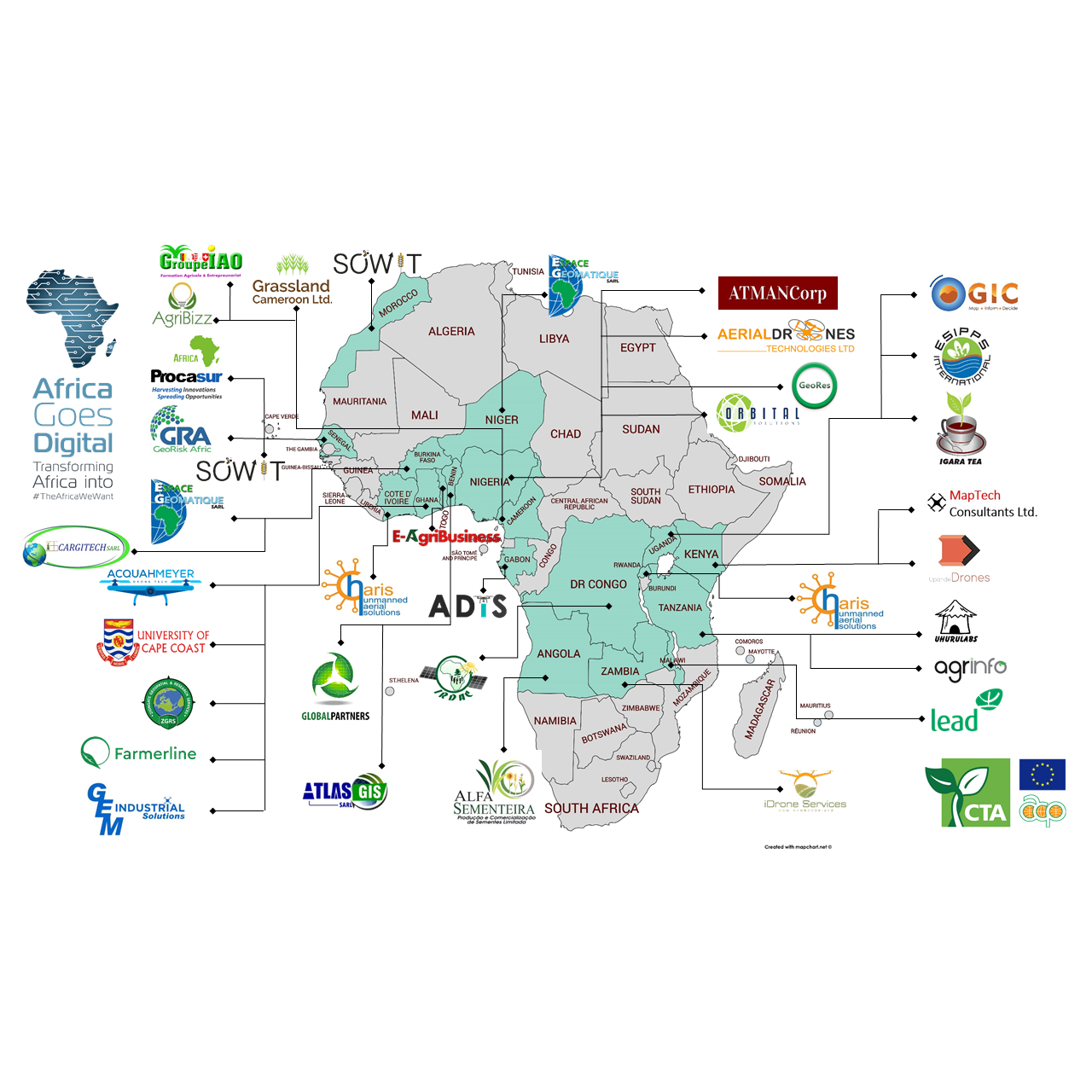A project in Benin has been carried out with small-scale paddy rice farmers to determine their acceptability of, and willingness to pay for, drone-based advisory services aimed at enhancing productivity. Implemented by Global Partners and funded by the Technical Centre for Agricultural and Rural Cooperation ACP-EU, the project revealed the drone-based services that producers value the most, as well as the prices they are willing to pay compared with what they would pay skilled workers to complete a similar tasks.
In Benin, agriculture is a strategic sector for economic and social development, given its contribution to Gross Domestic Product and job creation. However, the sector has major limitations, especially the low productivity and production of priority agricultural sectors, the low resilience of producers to the effects of climate change, land degradation, and climate risk management. These weaknesses are due, among other things, to the use of traditional tools, a low rate of adoption of improved seeds, low water use efficiency, inadequate technical supervision, and inadequate infrastructure. These limits pose a great threat to the food security of current and future generations. By 2050, the population of Benin is expected to double, thus significantly increasing the country’s food needs. Producers will have to double (at least) current production to hope to meet this demand. There is an urgent need, therefore, for farmers to be more efficient and productive while enhancing the incomes they receive from their activities.

The use of precision farming tools such as unmanned aerial vehicles (UAVs) – commonly known as drones, can contribute to meeting the need for increased farm efficiency. However, despite the growing popularity of UAVs for leisure purposes and for making commercial photos and videos, drones are not yet very well known in Benin. Until 2013, the few drone initiatives in Benin are for natural resource conservation and urban planning by the Beninese start-up Global Partners Sarl and the Beninese National TV agency for reporting.
However, in the field of agriculture, the use of UAVs was still a new idea in Benin until 2016 when Global Partners Sarl developed and implemented projects with the support of CTA and the University of Kentucky in the US, which aim to provide agricultural services to smallholders in Benin. Using a UAV-mounted multispectral imaging system, Global Partners is helping farmers to monitor the health of their crops, assess plant nutrient requirements, and derive fertiliser recommendations. These services can help smallholders increase their productivity and agricultural production and improve their incomes.
One of Global Partners’ current projects concerns the evaluation of the viability of drone services in a small-scale farming context, particularly for rice producers. A specific objective is to assess the acceptability and willingness of small rice producers to pay for drone services. Indeed, the acceptability and the price that producers are willing to pay are major determinants of the successful introduction of drones into agriculture.
Methodology and data collection
To answer the question regarding the willingness of small producers to pay for drone services, the project adopted a randomised controlled experiment in the municipality of Glazoué, which is one of the two rice development hubs in Benin. In order to evaluate the impact at the end of the project, baseline (reference data) were collected from November to December 2017 from a total of 232 rice farmers. This reference data will be compared with end-of-project data to evaluate the impact of the drone services. During the reference survey, images of drones were presented to farmers as well as explanations of their benefits. Following these activities, data was collected on farmer perceptions and preferences for the use of drones, as well as the type of services preferred and the price the producers were willing to pay. Thus, these ‘declared’ producer prices are based on their understandings and perceptions of the benefits of using drones for rice production.
Rice farmer perception regarding drone benefits
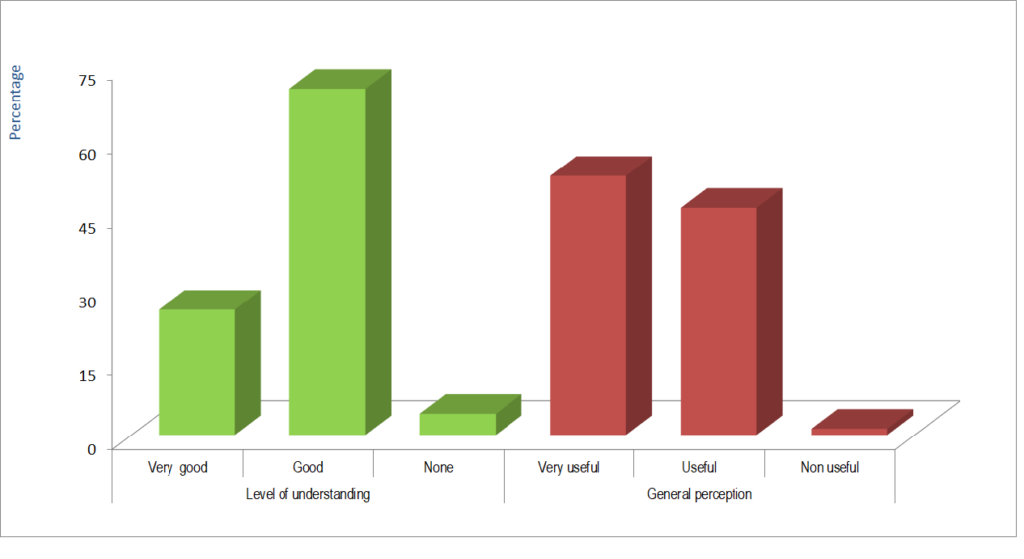
The preliminary results showed that the vast majority of producers (70.26%) have a good understanding of the benefits of drones for rice production. Just over half (52.59%) considered drone services ‘very useful’ while 46.12% found it ‘useful’ (Figure 1). Thus, almost all rice producers perceived the use of drone services as a useful technology that will help increase rice productivity, and production, as well as incomes.
Regarding the preferred drone services of rice farmers, nearly half of the producers surveyed (45.45%) highly valued the ease and freedom of movement that drones offer. The second most popular advantage for rice farmers is the efficient application of herbicides (37.36%), while 11.69% of rice farmers mentioned the efficient application of fertilisers as the most popular benefit.
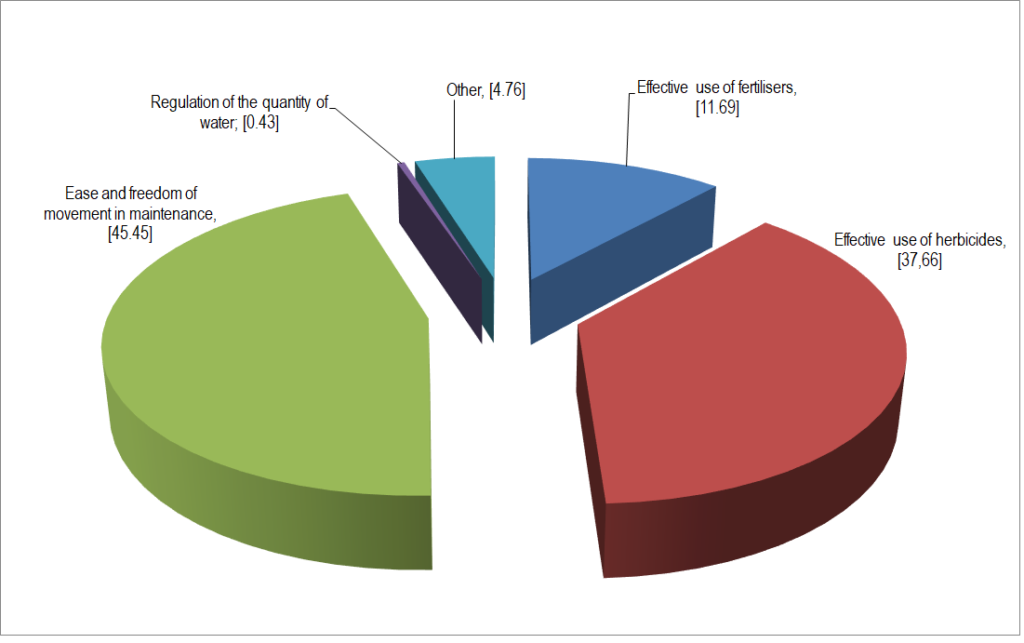
Willingness of rice farmers to pay for drone services
The results show that the majority of producers are willing to pay less than FCFA 5000 / ha (€7.62 / ha) for drone services. In terms of identification of pests and diseases, pesticide application and fertiliser application, 70.56, 70 and 66.67% wanted to pay less than FCFA 5000 / ha for the services, respectively.
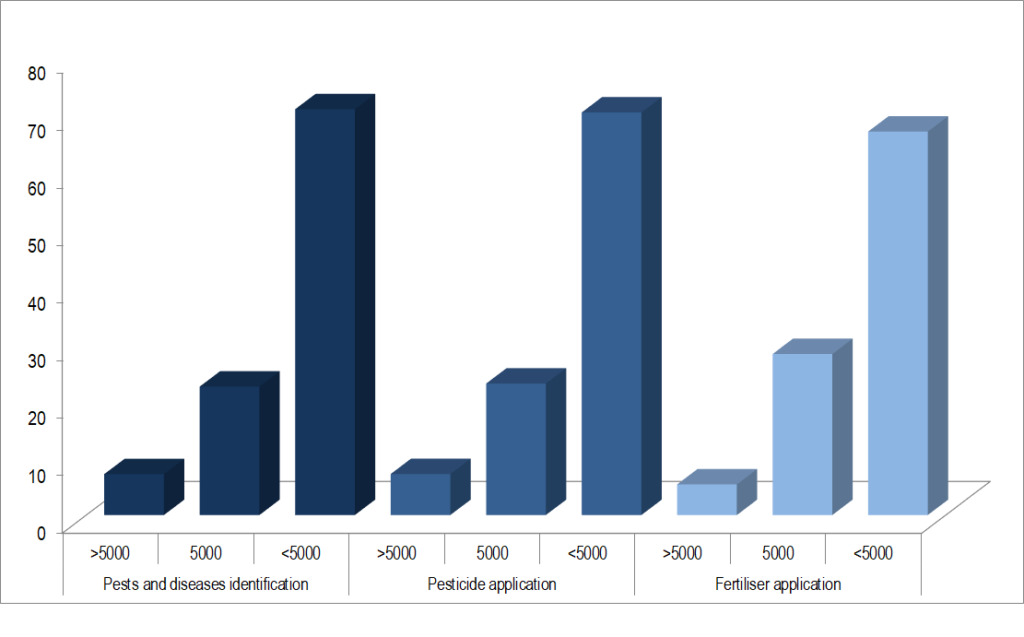
Based on their price statements, Figure 4 shows that rice farmers are willing to pay FCFA 3,345 / ha (€5.10 / ha) on average for the identification of pests and diseases, as compared to FCFA 8,510/ ha (€12.97 / ha) on average for the same service when carried out by a person – a reduction of 60.7%. This reduction could be explained by the fact that farmers perceive the drone as a technology that significantly reduces the time needed and the drudgery to complete the various farming operations. On the other hand, farmers’ responses were based only on their understanding and perception of drones services – and many may not have used the technology themselves. A comparison of their willingness to pay should, therefore, be undertaken once they have used the service. This would be a good indicator of the value of the information and services provided by the drones. Further studies will help test this assumption.
Regarding fertiliser application, on average, farmers are willing to pay FCFA 2,597/ ha (€3.96) – about one-third of the cost of manual spreading (FCFA 7,500/ ha or €11.44) in the study area. On the other hand, with regard to the application of pesticides by drones, the producers are willing to pay FCFA 3,391 / ha as compared to FCFA 3,218 / ha which would be paid to pesticide application specialists – an increase of 5.38%. This increase, though small, can be explained by the fact that rice farmers perceive drones as capable of applying pesticides quickly and efficiently. They are therefore willing to slightly increase the price knowing that this will be recovered in the quantity of input used.
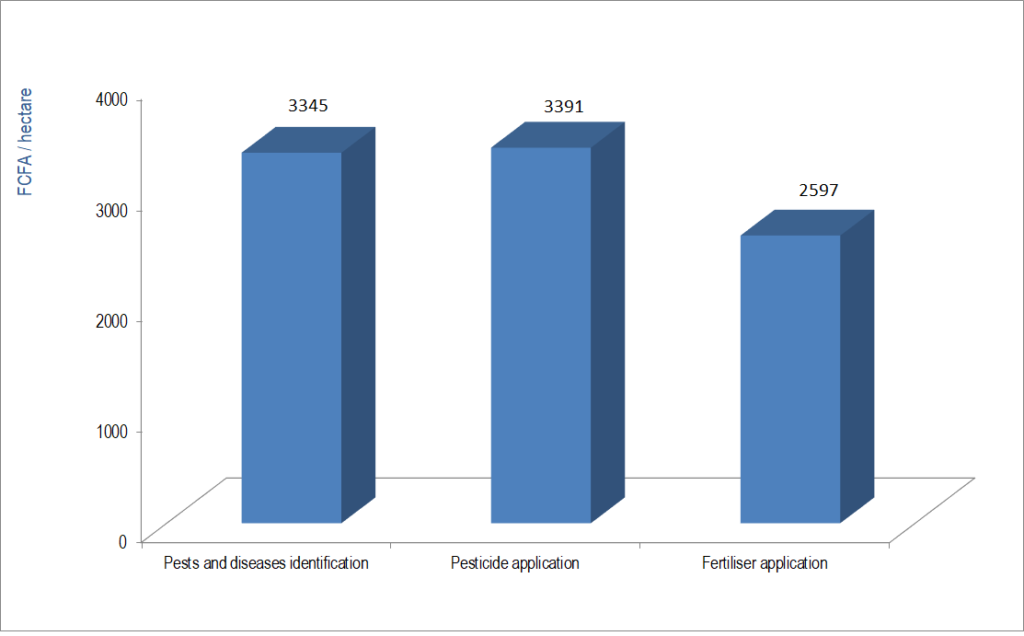
Lessons learned
This study conducted in Benin on rice farmers shows that producers have a good perception of drones and their benefits. Analyses of the data gathered show that rice farmers prefer to use drone services when carrying out certain farming operations, in particular, the identification of pests and diseases, the application of pesticides, and fertiliser application. However, they are willing to pay less for these services when compared to what they would pay skilled workers to provide the same service – with exception of pesticide application for which they would pay a slightly higher amount. For increased adoption of UAV technology, producers are calling for increased information dissemination, reduced service costs, and increased availability of the technology.
Many farmers are eager to be involved with the project currently carried out by Global Partners to benefit from the increase in farm productivity and income. UAVs have a promising future for small and medium-sized farms in Benin. Further studies are needed to provide evidence related to farmers’ willingness to accept and pay for drones services especially after farmers have been exposed to drones services.
About the authors:
Dr. Ouidoh Fructueuse
Managing Director at Global Partners
Email: frudenou@yahoo.fr
Dr. Abdelaziz Lawani
Founder of Global Partners
Email: abdelawani@gmail.com
Arsene Agossadou
In charge of monitoring and impact assessment at Global Partners
Email: aj.agossadou@gmail.com
Global Partners SARL
www.gblpartner.com
Email: globalpartnersbj@gmail.com
